Danny (Chris Bunton) is an accomplished athlete. The defined musculature of his back and arms betrays both physical strength and mental discipline. The shelf next to his bed is heavy with trophies and medals – even at his young age, evidence of a long and successful gymnastics career. But despite his success – or, maybe, because of it – the gymnasium has lost its appeal for him. He’s got his sights set on a new goal: he wants to be a boxer. His athleticism and strength are obvious, yet his dream seems to be impossible. Because Danny has Down syndrome.
Becoming comfortable with who we are, while pushing our horizons and discovering the boundaries of our capabilities, is an important aspect of self-development and growth – perhaps never more so than at that crucial stage between our teenage years and early adulthood. But for some, this is a lot harder than it is for others. Milestones others take for granted – like living independently, dating or choosing which hobby or sport to pursue – are often hindered by obstacles, if not entirely out of reach, for a young person living with an intellectual disability like Down syndrome. And often, these obstacles have less to do with that person’s physical or mental capacity than with the prejudice and attitudes of everyone around them – whether they mean to harm or protect.
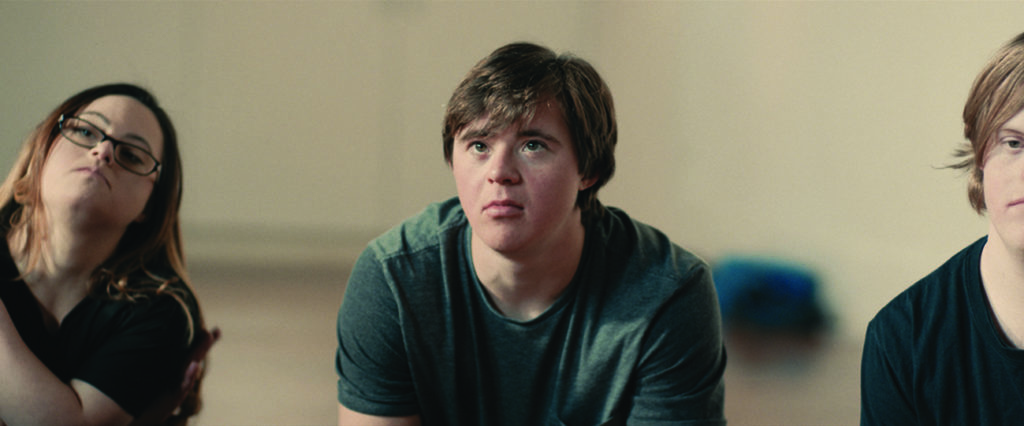
Paul Barakat explores this struggle for self-actualisation and self-acceptance in his debut feature, Kairos (2019). With its slightly shabby fighting gym owned by gritty, ageing pugilist John (Jerome Pride) and its underdog hopeful protagonist collecting dirty towels while dreaming of success in the ring, Kairos seems to have all the hallmarks of a standard boxing drama. But the film goes beyond such tropes to explore something deeper, following Danny’s struggle to reconcile his desire to be just like everyone else with a world that makes him feel constantly and relentlessly Othered.
Bunton takes the helm of a diverse cast consisting of a mixture of known and emerging actors, making Kairos the first Australian feature film with an actor with Down syndrome in the lead. Bunton is no stranger to the big or small screen; he first appeared as Evan in black comedy Down Under (Abe Forsythe, 2016), followed by a range of dramatic appearances, including in television shows Doctor Doctor and The Other Guy and new and upcoming features Relic (Natalie Erika James, 2020)[1]See Josh Nelson’s ‘House of Horrors: Ageing and Loss in Natalie Erika James’ Relic’ in this issue of Metro, pp. 12–7. and Jonathan Ogilvie’s Lone Wolf. Like Danny, Bunton is also an accomplished gymnast, having represented Australia at the Special Olympics in 2007, 2011 and 2016, where he won two gold medals, and currently holding the national title in men’s artistic gymnastics. Bunton additionally works as a coach for his local gymnastics club, as a communications assistant for Special Olympics Australia,[2]‘Artist: Chris Bunton’, PACT website, <http://www.pact.net.au/chris-bunton>, accessed 22 July 2020. and as a people and culture coordinator for a large Australian accounting firm. It would be a packed résumé even for someone without a disability, and Bunton had the odds stacked against him for each of his achievements.
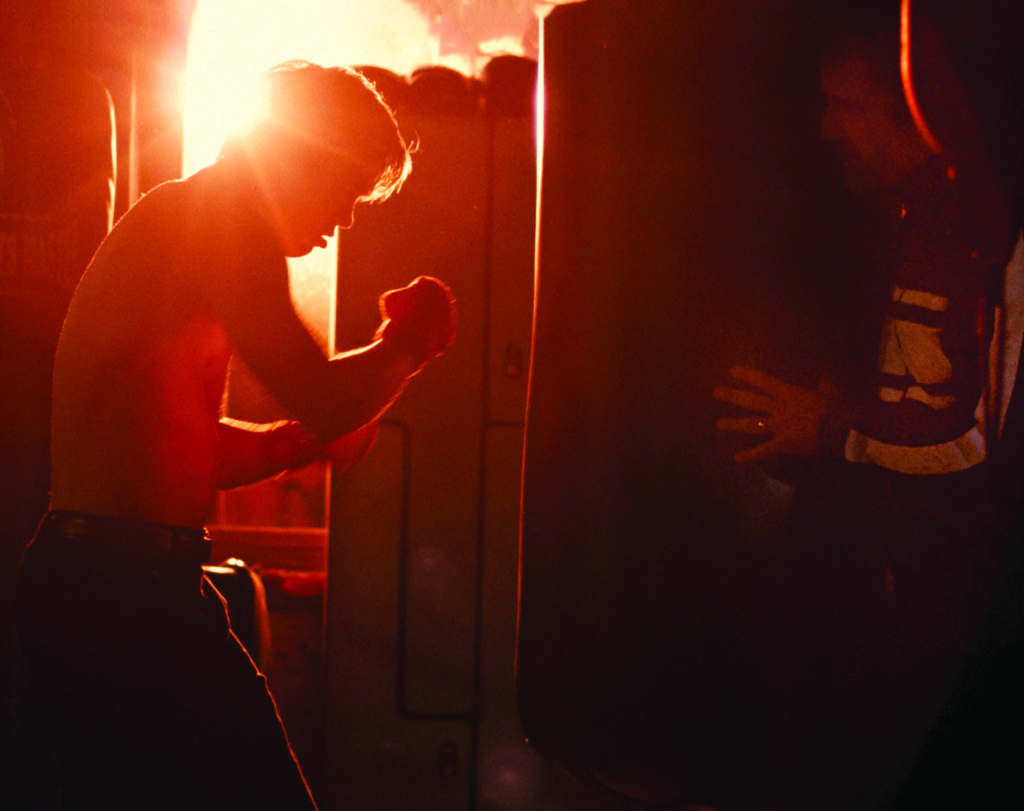
According to the most recent data from the Australian Bureau of Statistics, in 2018 just over half of the 2.1 million Australians living with a disability of working age (between fifteen and sixty-four years old) participated in the labour force – meaning they were either employed or seeking employment. Less than half – 47.8 per cent – actually had a job, making the unemployment rate for disabled Australians 10.3 per cent, or more than double the overall Australian unemployment rate, which stood at 4.6 per cent at the time.[3]Australian Bureau of Statistics, ‘Disability’, Disability, Ageing and Carers, Australia: Summary of Findings, 2018, 2019, <https://www.abs.gov.au/AUSSTATS/[email protected]/Latestproducts/4430.0Main%20Features52018>, accessed 22 July 2020. Bunton is also beating the odds by actively participating in sport – while nearly 60 per cent of children with disability aged five to fourteen engage in sport or physical recreation with other people, this number drops to less than 40 per cent for teenagers and adults between fifteen and sixty-four years old.[4]ibid.
Despite his obvious success, Bunton is no stranger to the annoyances, obstacles and discrimination Danny experiences in Kairos. Appearing as himself in the ABC’s You Can’t Ask That episode on Down syndrome, he laments,‘What gets me upset is when someone doesn’t listen to me […] People treat me like a child. Literally like a child […] Sometimes they call me “Downs”.’ Danny too struggles with how the people in his life treat him. Some of these annoyances – like his protective, sometimes overbearing foster mother, Jude (Deborah Jones); and foster brother, Sam (Digby Webster), who has no regard for his personal space or privacy – are a familiar complaint for many young adults. Others are more sinister, and more specific to Danny’s experience living with Down syndrome. Whether it be the agent of the gym’s star fighter, Marco (Jayden Byrne), calling him a ‘retard’, a testosterone-riddled boxer in Marco’s shadow taking out his frustration on Danny by humiliating him in front of the other fighters, or simply strangers on the train unabashedly staring at him or silently moving seats when he arrives, there’s much to remind Danny that there’s something different about him. It’s no wonder then that he struggles with his identity, and deep down fantasises about being ‘normal’ – whatever that means.
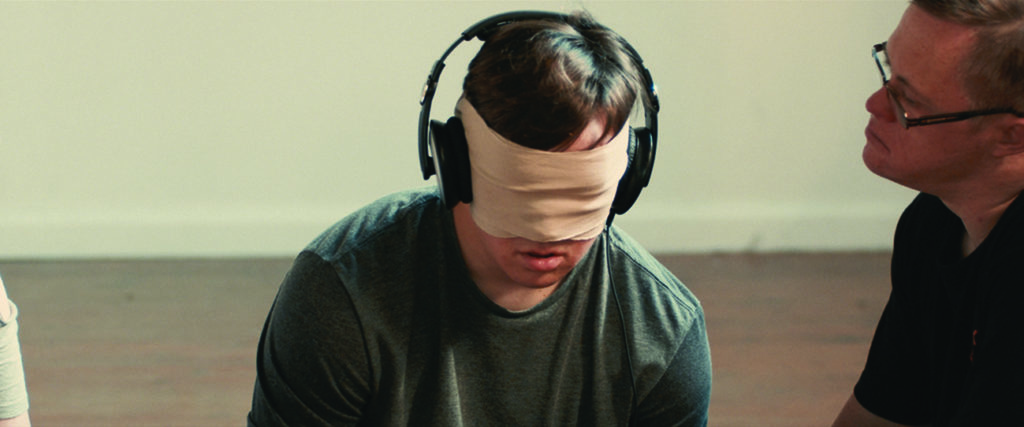
Worst of all, everyone but Danny seems to agree on one point: there is no way that he can or should box. And therein lies the story’s key catalyst, and unfortunately also its key weakness. Because whether it’s Jude dismissing his ambition by simply saying, ‘You know that can’t happen,’ or trainer John answering Danny’s challenge about why he won’t train him with ‘because it’s wrong’, Kairos relies on the idea that boxing and Down syndrome are two mutually exclusive concepts. Which raises the question: why?
It doesn’t take much imagination to conjure up any number of ethical dilemmas and opportunities for exploitation when someone with an intellectual disability participates in combative contact sports. But just because something has the potential to be dangerous or compromising does not mean it should automatically be forbidden – certainly not if we are to believe that individuals with Down syndrome have just as much right as anyone else to pursue individual self-fulfilment and make decisions about their lives and bodies.
In fact, it is this very concept that caused MMA fighter Garrett ‘G Money’ Holeve to legally challenge his home state of Florida and publicly petition the state’s combat-sport regulator in 2013 over the cancellation of a match on the grounds that he had Down syndrome.[5]‘The Martial Arts Fighter with Down’s Syndrome Battling for the Right to Fight’, The Guardian, 12 October 2015, <https://www.theguardian.com/society/video/2015/oct/12/martial-arts-fighter-downs-syndrome-right-fight-video>, accessed 22 July 2020. He was supported by the American National Down Syndrome Society (NDSS), which released a statement describing that ‘what Garrett is asking for is full-inclusion and full-participation in the sport of his choosing [… to] achieve his own hopes, dreams, and aspirations’.[6]Sara Hart Weir, quoted in Alex Heigl, ‘MMA Fighter with Down Syndrome Battles for the Right to Compete: “The Only Thing I Want to Be Is a Fighter”’, People, 13 October 2015, <https://people.com/celebrity/garrett-holeve-mma-fighter-with-down-syndrome/>, accessed 22 July 2020. While the lawsuit was eventually dropped, Holeve was able to compete – first in Missouri, and later in his native Florida – and the public battle to get him there earned him the Self-Advocate of the Year Award from the NDSS in 2015. In October 2015, VICE journalist Sarah Kurchak astutely and bluntly summarised the central dilemma of Holeve’s case:
Our society might be getting better at accepting that disabled people exist [… but] the issue becomes much thornier when it comes to actually accepting disabled people as autonomous human beings who will not always make decisions that don’t challenge other people’s preconceived notions of them.[7]Sarah Kurchak, ‘Why People with Down’s Syndrome Should Be Allowed to Compete in MMA’, VICE, 16 October 2015, <https://www.vice.com/en_uk/article/ez3jd4/why-people-with-downs-syndrome-should-be-allowed-to-compete-in-mma>, accessed 22 July 2020.
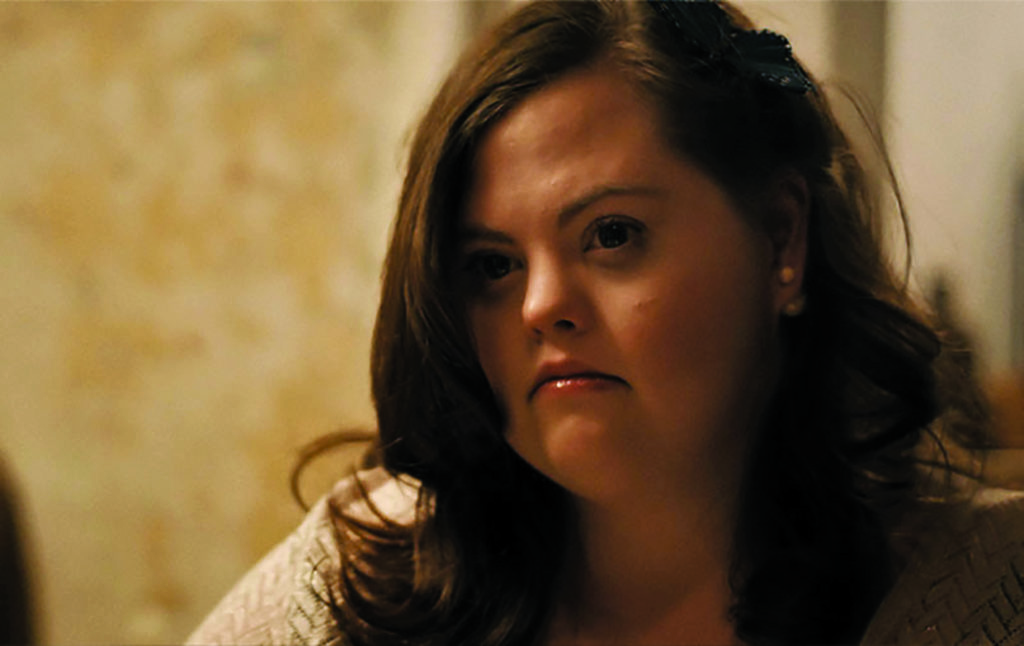
If the film is to do justice to this principle, then the central challenge in Kairos should not be that Danny wants to do something he can’t or shouldn’t do, but rather how the people around him can work with Danny to enable his ambition in a way that is also safe and appropriate for his physical and cognitive abilities.
It is true that some people with Down syndrome can suffer from secondary conditions like hypotonia (decreased muscle tone), joint subluxation (where a connecting bone is slightly out of its joint) and hyperflexibility,[8]Jane Tracy, ‘Australians with Down Syndrome: Health Matters’, Australian Family Physician, vol. 40, no. 4, 2011, p. 204, available at <https://www.racgp.org.au/download/documents/AFP/2011/April/201104tracy2.pdf>, accessed 22 July 2020. each of which may make boxing physically unsafe for Danny. But no physical restrictions are mentioned in the film, and his successful gymnastics career suggests that they are unlikely. The audience is to assume, then, that Danny must be denied his ambition on purely ethical grounds – that, as John says, his dream is just ‘wrong’. Why, if the concern is pitting him against able-bodied fighters in the ring, he can’t even be trained in proper technique and conditioning on the bags is never explained.
This inconsistency is problematic because all of the key events and actions of various characters in Kairos rely on the flawed premise that John training Danny is morally indefensible. Without it, the level of secrecy that ensues once John does relent and show Danny some moves in the ring, and his subsequent bursts of manipulation and intimidation to ensure the secret is kept after things inevitably go wrong, feel unnatural and disproportionate. John’s character in particular suffers from this, but it feels like the script often gets in the way of the cast in their efforts to portray rounded individuals whose actions seem in keeping with the world they inherit.
None of the film’s shortcomings can be levelled against the cast, who invariably do an admirable job bringing their characters to life – proving beyond doubt that Down syndrome should be no barrier to headlining a commercial film.
Fortunately, the inconsistent script is the only clear shortcoming of this independent feature, which in other areas punches well above its modest budget. Amanda Brown’s score beautifully accompanies the film, and, combined with the sombre cinematography from Bryan Coelho and Samuel Lancaster, creates a haunting, polished universe for Danny to inhabit. The dream sequences in which Danny imagines himself without Down syndrome, before re-emerging as himself at the end of the film, feature some beautiful symbolism, while well-framed shots of Danny’s profile against the light evoke Greek statues, harking back to the film’s title: Kairos, an Ancient Greek term sometimes translated as ‘the divine moment’.
Most importantly, none of the film’s shortcomings can be levelled against the cast, who invariably do an admirable job bringing their characters to life – proving beyond doubt that Down syndrome should be no barrier to headlining a commercial film. Bunton portrays Danny’s complex emotional journey with the same nuance a neurotypical lead would be expected to, and creates a likeable and extremely sympathetic hero. As Sam, Webster is invariably scene-stealing in his outrageous level of charisma and humour. Audrey O’Connor, Bunton’s real-life girlfriend,[9]Chris Bunton, in ‘Kairos’, The Project, Facebook Video, 3 June 2018, <https://www.facebook.com/watch/?v=10155571194363441>, accessed 22 July 2020. brings great emotion to Danny’s love interest Ellie, who is initially hurt by Danny’s rejection before becoming the key to helping him feel comfortable in his own skin. The scene of Danny and Ellie’s first date is a particular highlight, as they awkwardly get to know each other as any young couple would while their respective mothers sit tucked away discreetly in the restaurant as chaperones, comparing the various injustices their children have had to suffer due to their disability.
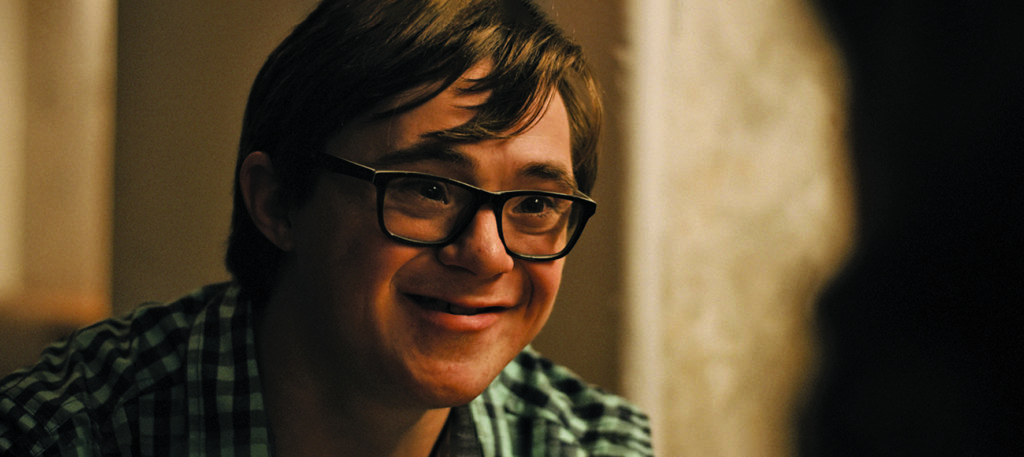
Kairos was well received by critics and audiences alike after its premiere at the Tertio Millennio Film Fest 2018 in Italy, where it won top prize, and Australian showing at the 2019 Melbourne International Film Festival, earning itself a limited cinema release in Australia. For Barakat, this success is only one aspect of what he wants his film to achieve:
I sincerely hope our film can inspire other filmmakers to be more inclusive in casting […] I believe the time has come for more diverse stories to be brought to our screens and stages and hopefully Kairos can play a small part in that process.[10]Paul Barakat, quoted in ‘Kairos: The Australian Film Looking to Shift How We View Disability on Our Screens’, The Big Smoke Australia, 21 March 2018, <https://www.thebigsmoke.com.au/2018/03/21/kairos-australian-film-looking-shift-view-disability-on-our-screens/>, accessed 22 July 2020.
As for Bunton, with his first lead role now under his belt, he has already set his sights on bigger and better things: when The Project’s Lisa Wilkinson asked him in an interview whom he’d like to work with in future, he wasn’t short of an answer: ‘Steven Spielberg; Mel Gibson, definitely; Matt Damon; Vin Diesel, definitely Vin Diesel; and The Rock […] Because I’m athletic, they’re athletic – I could take them on.’[11]Bunton, op. cit. And judging by Bunton’s track record so far, he probably could.
Endnotes
| 1 | See Josh Nelson’s ‘House of Horrors: Ageing and Loss in Natalie Erika James’ Relic’ in this issue of Metro, pp. 12–7. |
|---|---|
| 2 | ‘Artist: Chris Bunton’, PACT website, <http://www.pact.net.au/chris-bunton>, accessed 22 July 2020. |
| 3 | Australian Bureau of Statistics, ‘Disability’, Disability, Ageing and Carers, Australia: Summary of Findings, 2018, 2019, <https://www.abs.gov.au/AUSSTATS/[email protected]/Latestproducts/4430.0Main%20Features52018>, accessed 22 July 2020. |
| 4 | ibid. |
| 5 | ‘The Martial Arts Fighter with Down’s Syndrome Battling for the Right to Fight’, The Guardian, 12 October 2015, <https://www.theguardian.com/society/video/2015/oct/12/martial-arts-fighter-downs-syndrome-right-fight-video>, accessed 22 July 2020. |
| 6 | Sara Hart Weir, quoted in Alex Heigl, ‘MMA Fighter with Down Syndrome Battles for the Right to Compete: “The Only Thing I Want to Be Is a Fighter”’, People, 13 October 2015, <https://people.com/celebrity/garrett-holeve-mma-fighter-with-down-syndrome/>, accessed 22 July 2020. |
| 7 | Sarah Kurchak, ‘Why People with Down’s Syndrome Should Be Allowed to Compete in MMA’, VICE, 16 October 2015, <https://www.vice.com/en_uk/article/ez3jd4/why-people-with-downs-syndrome-should-be-allowed-to-compete-in-mma>, accessed 22 July 2020. |
| 8 | Jane Tracy, ‘Australians with Down Syndrome: Health Matters’, Australian Family Physician, vol. 40, no. 4, 2011, p. 204, available at <https://www.racgp.org.au/download/documents/AFP/2011/April/201104tracy2.pdf>, accessed 22 July 2020. |
| 9 | Chris Bunton, in ‘Kairos’, The Project, Facebook Video, 3 June 2018, <https://www.facebook.com/watch/?v=10155571194363441>, accessed 22 July 2020. |
| 10 | Paul Barakat, quoted in ‘Kairos: The Australian Film Looking to Shift How We View Disability on Our Screens’, The Big Smoke Australia, 21 March 2018, <https://www.thebigsmoke.com.au/2018/03/21/kairos-australian-film-looking-shift-view-disability-on-our-screens/>, accessed 22 July 2020. |
| 11 | Bunton, op. cit. |





